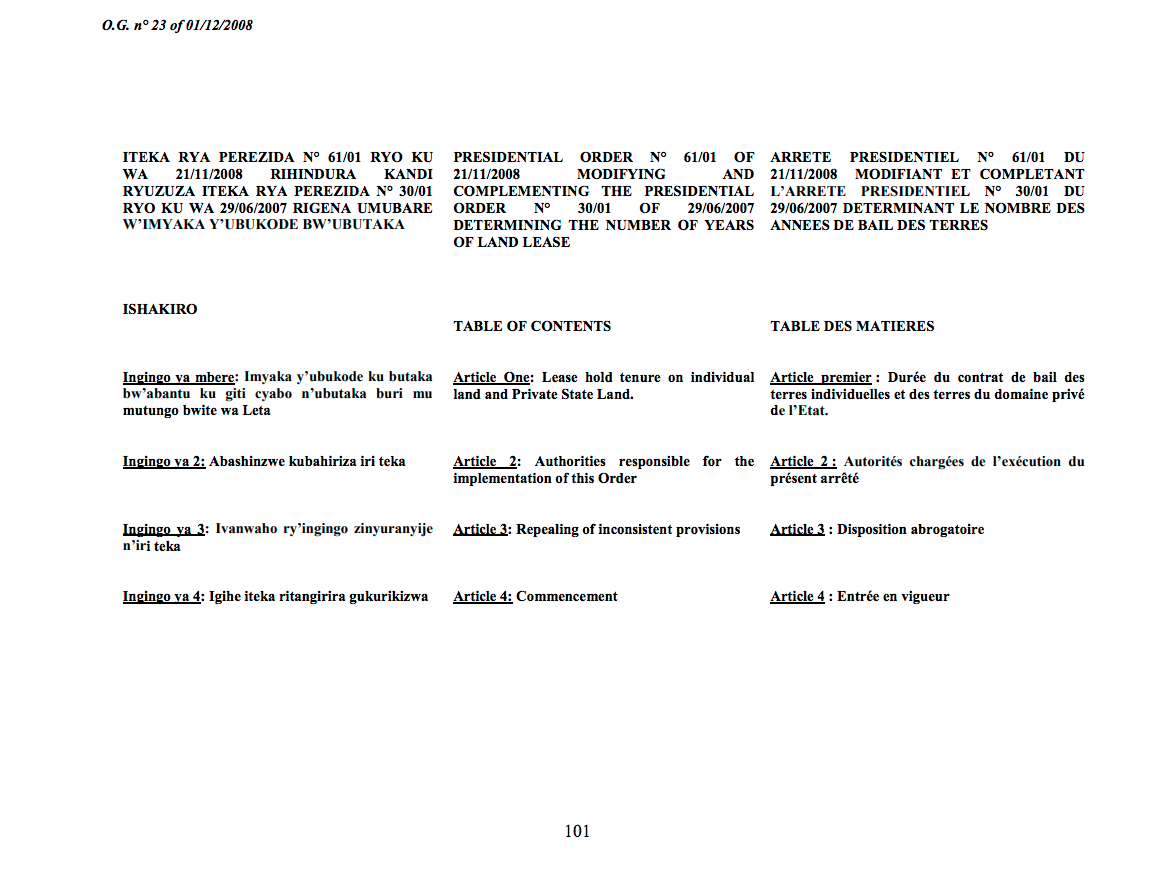The LAND Project is a five year program supported by the United States Agency for International Development (USAID). Its primary goal is strengthening the resilience of Rwandan citizens, communities and institutions and their ability to adapt to land-related economic, environmental and social changes.
Resilience is defined as “the ability to withstand or recover from difficult conditions.” It also comprises the ability of human and ecological systems to recover from shocks or difficult changes, and to transform to a better condition by responding flexibly and creatively to stress factors. In Rwanda, land tends to be one of the primary assets citizens rely on to buffer against difficult conditions and rapid change.
The project’s central objectives are twofold:
1.Increased capacity of local Rwandan institutions to generate high quality, evidence-based research on land-related issues that can be used by the Government, civil society organizations, and Rwandan citizens.
2. Increased understanding of land laws, policies, regulations, and legal judgments on land-related issues by GOR officials, local civil society organizations, research institutes and citizens.
Key outcomes of the project include:
- Holding annual National Land Research Agenda workshops to establish the research priorities of land sector stakeholders that the LAND Project will support. These workshops bring together multiple stakeholders from government, civil society and the research community;
- Supporting research on land-related issues through competitive awards to Rwandan research institutions, universities, and civil society organizations, and providing tailored capacity building assistance to improve research and advocacy capabilities;
- Offering training and other support to legal assistance providers to enhance their capacity to support women and vulnerable populations in understanding and realizing their land rights;
- Training local land authorities on the implementation of the land law and regulations.
- Carrying out research on critical land issues, including gendered land rights in practice, community rights to resources in and around protected areas, and expropriation.
- Managing a land-focused website to improve research, communications, and policy advocacy efforts that are focused on land, and to act as a vehicle for enhancing collaboration between actors working in the land sector;
- Providing organizational development support to civil society organizations supporting women’s land rights.
- Supporting innovative and coordinated communications approaches by civil society and government that enhance the knowledge of Rwandan citizens about research findings and their land rights.
Because the LAND Project is a five year endeavor, we are seeking an institution that has the interest, capacity, skills and resources to eventually take over hosting and maintenance of the website, ensuring it stays up-to-date and relevant to the land sector stakeholder community. If your organization is potentially interested in assuming management of this site, please contact us and tell us why you believe your institution would be an ideal candidate.
Members:
Resources
Displaying 96 - 100 of 149Returnees Land Access: Lessons from Rwanda
This background briefing reports on a study of land access
for returnees in Rwanda, and the impacts of land access
policies in the post-conflict period. It also seeks to
understand better the roles international humanitarian
agencies and NGOs have played, and how their performance
can be improved. It is not suggested that Rwanda is typical,
but rather that the centrality of land issues there has thrown
up a revealing set of broader questions.
Returnees Land Access: Lessons from Rwanda
This background briefing reports on a study of land access
for returnees in Rwanda, and the impacts of land access
policies in the post-conflict period. It also seeks to
understand better the roles international humanitarian
agencies and NGOs have played, and how their performance
can be improved. It is not suggested that Rwanda is typical,
but rather that the centrality of land issues there has thrown
up a revealing set of broader questions.
Presidential order N° 61/01 of 21/11/2008 Modifying and Complementing the Presidential Order N° 30/01 of 29/06/2007 Determining the Number of Years of Land Lease
Presidential order N° 61/01 of 21/11/2008 Modifying and Complementing the Presidential Order N° 30/01 of 29/06/2007 Determining the Number of Years of Land Lease.
Published on the 1 December 2008.
Returnees Land Access : Lessons from Rwanda
This background briefing reports on a study of land access for returnees in Rwanda, and the impacts of land access policies in the post-conflict period. It also seeks to understand better the roles international humanitarian agencies and NGOs have played, and how their performance can be improved. It is not suggested that Rwanda is typical, but rather that the centrality of land issues there has thrown up a revealing set of broader questions.
Regional Differences regarding Land Tenancy in Rural Rwanda, with Special Reference to Sharecropping in a Coffee Production Area
This paper examines land tenancy systems and tenant contracts in Rwanda, with
respect to socioeconomic contexts. Our research in southern and eastern Rwanda produced
data suggesting that land borrowing with fixed rents has been generally practiced, and that rent
levels have been low in comparison to expected revenues from field production. In the western
areas of coffee production, however, the practice of sharecropping has recently appeared. This
system is advantageous to landowners, as they are able to acquire half of the harvests; in





